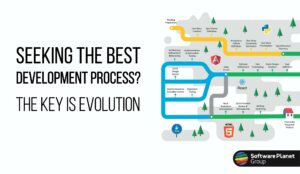When we take the role of a client ourselves, we notice how often initial conversations with contractors feel like wasted time. You explain your problem, but nothing meaningful comes back. No insights, no new perspective, nothing that would make the service better. The potential partner listens politely, takes notes, and leaves you with the sense that they are not really engaged. For us, that is unacceptable.
This experience shapes the way we handle our own projects. We want every meeting with a client to deliver value from the very beginning. Our guiding principle is simple: never waste a client’s time.

Bringing Technical Expertise to the First Meeting
One of the most frustrating situations for a client is when the first call is attended only by a marketing team. They listen carefully, but they cannot challenge assumptions, propose alternatives, or even confirm feasibility. The result is a second meeting, this time with engineers, and more lost time.
We avoid that. If a project aligns with our portfolio and expertise, we bring technical people to the very first discussion. This ensures that questions can be answered immediately, and possible solutions can be sketched on the spot.
Sometimes this approach even leads to amusing situations. Our CEO, who is 50 years old and has 27 years of experience in software development, occasionally joins meetings himself to support colleagues who are busy on other projects. Clients, seeing such a serious figure, sometimes assume he must be part of the marketing team and complain that they would prefer to speak directly with the developers. The irony is that the person they are dismissing is often the most experienced engineer in the company.
Turning Dialogue into Early Value
We in Software Planet Group treat initial meetings not as a formality but as the first step in co-creating the solution. That means we often start drawing prototypes directly during the call. Visualising ideas helps both sides quickly see whether we have understood the requirements correctly.
We also reflect back what we hear, rephrasing the client’s needs and adding details where relevant. This “active reflection” allows us to check our interpretation and, at the same time, enrich the original idea with our expertise.
We also prefer to speak openly about risks and the complexity of certain parts of the system. Already during the meeting, we outline how different modules are interconnected in terms of complexity, what risks we foresee, and how those risks might be addressed. This helps the client plan the sequence of development, which can be especially valuable when several teams are involved.
Another important question is price. We understand that our company does not provide a low-cost service, and we are not looking to compete on price. What we offer is a way of working and a level of quality that distinguish us from others. If a client decides another team is a better financial fit, our initial conversations still leave an impression that sometimes leads them back to us. And those clients, without exception, do return.
An important addition to a successful first meeting is our Full Stack expertise. Very often, instead of simply agreeing to use the technologies we already know, we propose the ones that are the best fit for the specific project. During discussions, we frequently suggest alternatives to the technologies initially chosen by the client, because in many cases there are better options for their needs. As we talk through the system’s functionality, we share recommendations in the form of specific services, concrete technologies, and links to articles that highlight relevant issues. In fact, 90 per cent of our meetings end with a follow-up email containing a list of the proposed resources.
Why This Matters
Our approach is not about speeding through the process; it is about making sure every interaction counts. Clients get an early glimpse of how we think and how we work. They do not leave the first meeting with vague promises but with concrete input that can shape their decisions.
This way of working stems from our own dislike of empty conversations. If we feel our time is valuable, our clients’ time is even more so.
That is why we build every interaction on the principle of immediate, practical value.


